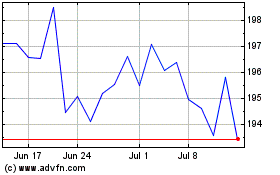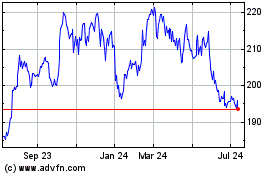UPDATE: Illinois House May Consider Tax On Stock, Derivatives Trades
February 28 2011 - 4:49PM
Dow Jones News
An Illinois state representative has introduced a bill that
would tax traders doing business in Chicago's futures, options and
stock markets.
The Financial Transaction Tax Act, put forth late last week by
Rep. Mary Flowers (D., Chicago), would charge one hundredth of one
percent of the value of transactions carried out on markets run by
CME Group Inc. (CME) and CBOE Holdings Inc. (CBOE).
The bill would add to heavier tax burdens borne by exchanges,
brokers and traders in Chicago, which has seen its status as the
"risk management capital of the world" threatened this month by a
proposed merger of major European rivals.
"This state is in dire need of new revenue," said Flowers in an
interview. She said she didn't know whether the idea would find
support with Illinois House Speaker Michael Madigan (D., Chicago)
or Gov. Pat Quinn, also a Democrat. The party controls both
chambers of Illinois state government.
"I wouldn't put it out there if I wasn't willing to fight,"
Flowers said.
The prospect of a tax on trading periodically arises in
Washington as a potential new source of government revenue, but
staunch opposition from industry groups, exchanges and major Wall
Street firms has helped keep such plans at bay on the federal
level.
"We're on the record opposing transaction taxes because they're
bad for business," said a CME spokesman Monday.
Illinois is among the U.S. states most desperate to fix its
balance sheet. Chicago-based businesses last month saw the state
corporate tax rate rise to 7% from 4.8% under a proposal backed by
Quinn to help shore up Illinois' beleaguered finances. Earlier this
month, he separately proposed borrowing $8.75 billion to help pay
overdue bills.
Flowers' bill has yet to be assigned to a committee, where it
will be looked at before the entire Illinois House of
Representatives would hear it. The proposed tax would go into
effect Sept. 1.
Patrick O'Shaughnessy, Chicago-based exchange analyst with
Raymond James Financial Inc. (RJF), said he believed the bill was
"very, very unlikely" to become law.
"It would substantially disadvantage Illinois-based exchanges
relative to their competitors and potentially even lead to
Chicago-based exchanges relocating," he said. "The net result would
be a loss of jobs and perhaps even a loss of revenue for
Illinois."
Tony McCormick, Chicago-based chief executive of BOX Options
Exchange, said that the tax bill's math "doesn't make economic
sense," and estimated that the tax could come out to about
one-third of a typical trading commission paid by retail-level
investors.
"If you want to drive business out of the state, then go for
it," McCormick said.
Flowers said she could negotiate on the tax's rate and duration
but rejected the notion that business could flow out of state or
overseas. Revenue from the tax ideally would help defray the
state's education and health-care expenses, she said.
"This is our country and we should all be interested in making
sure we survive," she said. "You mean to tell me this particular
group of people can't give something back?"
-By Jacob Bunge, Dow Jones Newswires; 312 750 4117;
jacob.bunge@dowjones.com
-Howard Packowitz contributed to this article.
CME (NASDAQ:CME)
Historical Stock Chart
From May 2024 to Jun 2024

CME (NASDAQ:CME)
Historical Stock Chart
From Jun 2023 to Jun 2024
